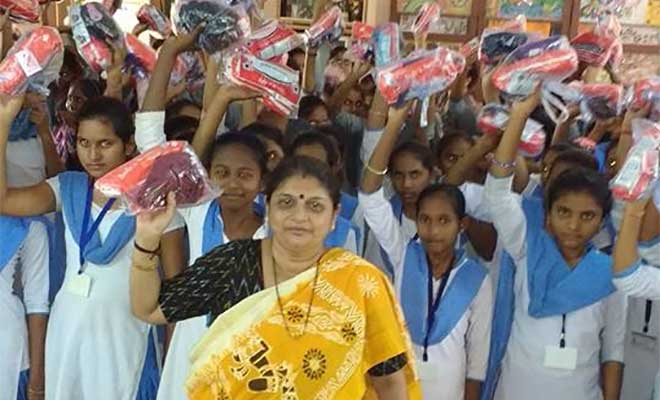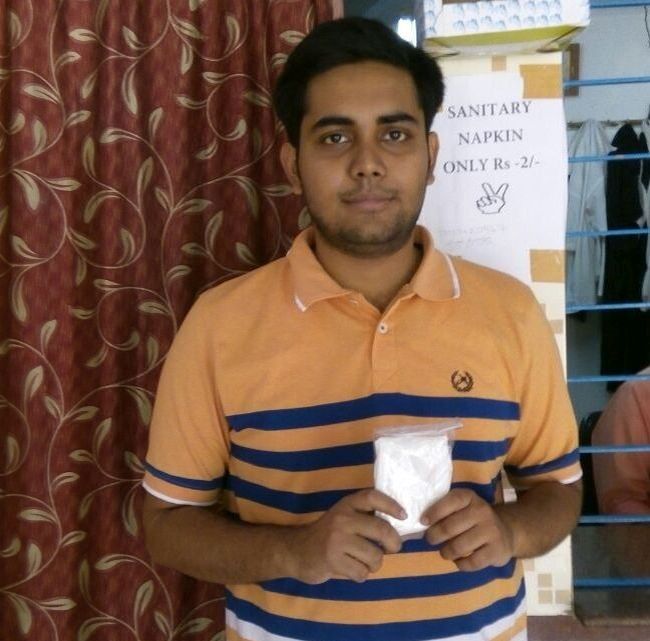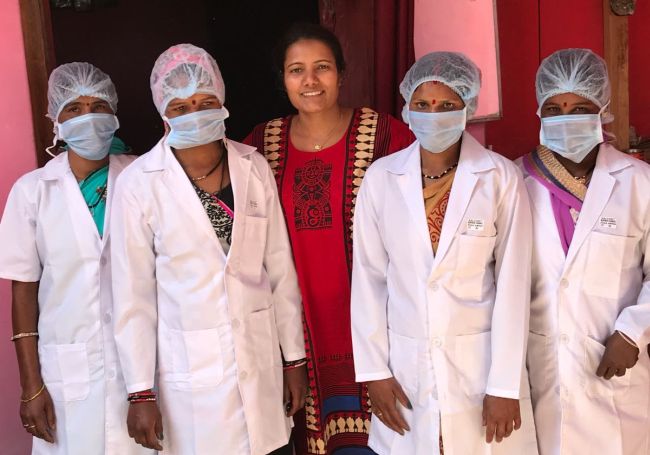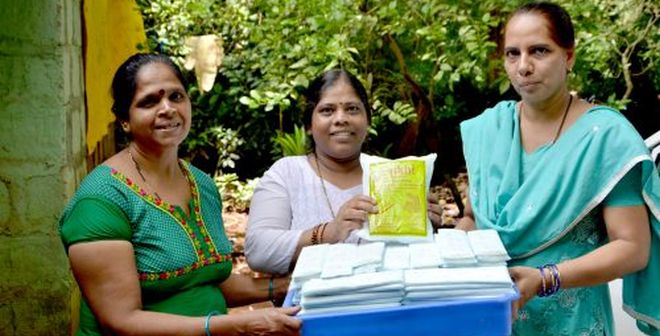New Delhi: Superstar Akshay Kumar’s biopic, PadMan puts the spotlight firmly on Arunachalam Muruganantham, a man of humble origins who gave India its first low-cost sanitary napkins making machine 14 years ago. But there are many more ‘PadMans’ in this country who are doing good work in the field of menstrual hygiene, away from all the limelight and media glare. It is not easy to work on an issue like menstruation, where roughly half (55 per cent) of the young girls in the country don’t know what it is, and only 12 per cent of the women use sanitary pads. When even today women themselves are ignorant about the dos and don’ts of menstruation and follow the unhygienic practices like using cloth, ash, sand or even husk during periods.
So whether it is the ‘PadWali Dadi’ from Surat, or Kolkata’s 21-year-old boy, be it Mathura’s Rohit Rajput, Maya Vishwakarma from Madhya Pradesh or Goa’s Saheli group, their stories are inspiring for taking the initiative to take on a taboo and the sheer grit some of them have shown against adverse conditions. Their sole objective has been to provide something as basic as sanitary napkins to as many women as they can.
1. Surat’s Very Own ‘PadWali Dadi’
Since July 16, 2012, Meena Mehta from Surat, along with her husband Atul, has been giving away hygiene kits to underprivileged girls for free every month. The hygiene kits contain one packet of sanitary napkins, two sets of undergarments, one bar of soap, and four shampoo sachets. Their aim to make sure no girl drops out of school when they attain puberty and no one ever catches an infection because of following unhygienic menstrual practices. Each kit they distribute costs Rs 50-70 and the couple has been utilising their life-long savings for this purpose. They also have created a sanitary napkins and undergarments bank through which they accept contributions from people. Their only condition, whatever comes to them should be in a good condition.
As of date, ‘PadWali Dadi’ has changed lives of 5,000 girls in Surat. Meena Mehta got inspired from Sudha Murthy, a social worker and the chairperson of Infosys Foundation, who sent four trucks of sanitary napkins to Chennai as relief supplies in the aftermath of the 2004 Indian Ocean tsunami.
2. Kolkata’s 21-year-old PadMan
Carrying ice cream cardboard boxes and sanitary napkins, Sobhan Mukherjee, a first year MSc Geography student of Ashutosh College, has been visitng city’s Pay and Use toilets to install his version of sanitary pad vending machine. What he does is something which anybody can do, he buys the sanitary napkins at a cost price of Rs 2 each from the distributor, places these in a self-made vending machine that’s made out of the ice cream cardboard boxes and installs it in the toilets.
Initially Sobhan started this self-funded mission for free, and then in order to sustain it, he started charging Rs. 2 for each sanitary napkin as opposed to the average cost of a sanitary napkin which is ₹5. Sobhan today is able to sell approximately 200 sanitary pads per month in one toilet.
Calling the initiative as Project Bandhan, Sobhan aims to break the social stigma prevalent in many sections of the society about menstruation and by providing it at a low-price, he wants to encourage women not to compromise with their health because of hesitation to go out and buy or issues of affordability when it comes to sanitary pads.
Sobhan is handling this initiative single handedly. Every month, he goes to each of these toilets to collect the money and re-fill the stock. Since, the vending machine costs around ₹15,000 and Sobhan doesn’t have that much money, he has made his own version of a sanitary napkin vending machine – it is made out of an ice-cream cardboard and is designed in such a way that it works exactly the same way as the traditional one.
3. ‘Pad jiji’ From Madhya Pradesh
Meet 35-year-old Maya Vishwakarma, she left her high-paying job in America in order to return home on a mission to provide an easy, affordable and an alternative to the traditional non-biodegradable sanitary napkins that are available in the market. She used her personal savings alongwith funds procured from crowdfunding and contributions from the California Foundation and Sukarma Foundation to buy a sanitary pad making machine from India’s original padman Arunachalam Muruganantham.
Today, she has set up a manufacturing unit run by an all-women staff at Dedwara village in Madhya Pradesh’s Narsinghpur, her native town. It is one of the tribal areas of the state, where one doesn’t even dare to utter words like “periods” or “sanitary pads” out loud. It is matter to be ashamed of and hidden from everyone, including family, let alone the merits and demerits scrutinised in public. Overcoming the odds, and fighting the ingrained social norms and practices, Maya started is distributing sanitary napkins and educating women on how to follow good menstrual hygiene practices.
Maya’s unit has the capacity to produce 1,000 sanitary pads in a month at the cost of Rs 20 a piece.
Maya zero-downed the idea of setting a sanitary pad unit in her hometown while she was working as a researcher on leukemia at the University of California. It is that time Maya reliased the crucial significance of menstrual hygiene.
4. Goa’s Saheli Group
Meet the friends of the environment – a Self Help Group (SHG) titled Saheli, they started working on the solutions to develop an environment friendly sanitary napkin in 2015. Saheli was started by Jayshree Parwar, who took up the challenge and initially set up a manufacturing unit in her home. After some research and funding from Teeratan Enterprises, Saheli came out with an eco-friendly product made of pine wood paper, silicon paper, butter paper that can be decomposed within eight days unlike the plastic based conventional pads that take more than 100 years to decompose completely. The cost of these eco-friendly versions was Rs. 40 (8 pads).
Slowly, Jayshree involved more women and taking utmost care in terms of hygiene and sanitation in the manufacturing process, and started producing sanitary napkins on a larger scale. Till now they have sold more than 2000 sanitary pads.
5. Rohit Rajput From Mathura
A lesser known man is Rohit Rajput from Mathura who has been making low-cost cloth sanitary pads from 26 years. He realised the need of good menstrual practices in the city when one fine day he got to know that women of his city don’t even know what a sanitary napkin is, forget about following good menstrual hygiene practices. And since then he has dedicated himself towards the cause of spreading awareness about sanitation and hygiene during menstruation persistently, apart from giving women the most basic thing – a sanitary pad.






























